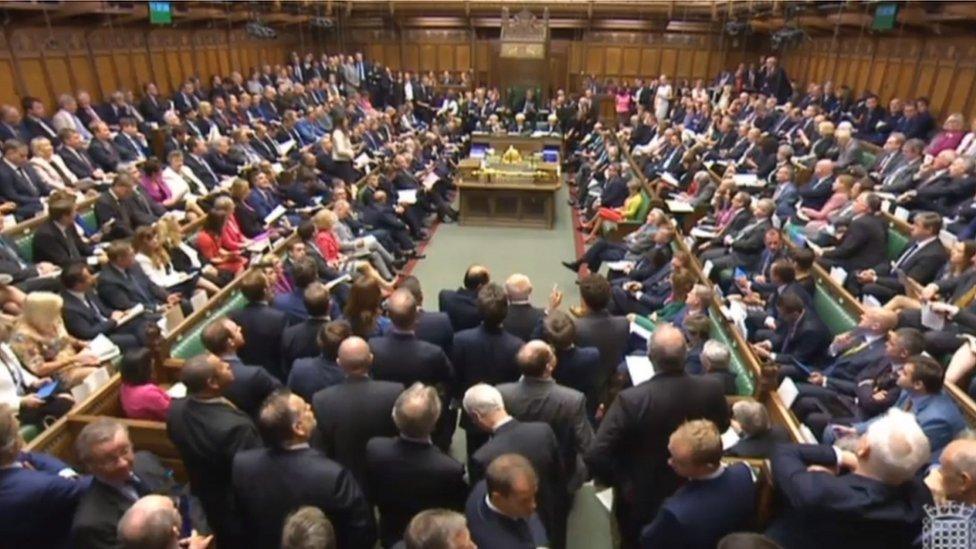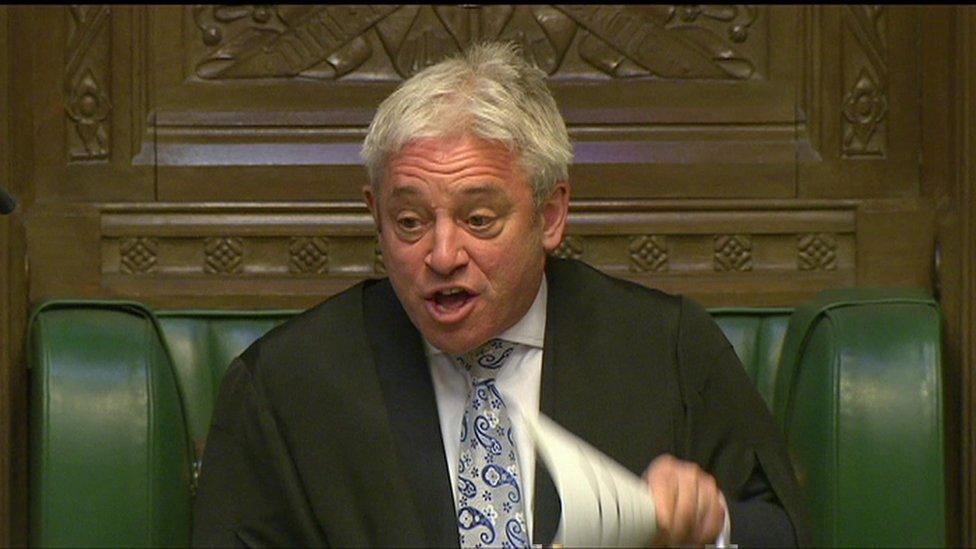What to watch out for after Easter
- Published

Don't forget your toothbrush - there could be some late nights for Brexit ping-pong
Parliament is taking a two-week break for Easter but Mark D'Arcy has been looking ahead to its return on Monday April 16th and has identified five things to watch out for.
May will be the cruellest month
MPs should make sure they have a toothbrush and a few changes of clothes handy because they can expect some long nights debating their response to the anticipated sheaf of hostile Lords amendments to the EU Withdrawal Bill, and determined attempts to stick requirements about a customs union into the Customs Bill, which is due back before them for report stage consideration.
The government will have a tough time preserving its majority as a variety of highly divisive Brexit issues are fought out. Peers should pack their ermine-trimmed jim-jams as well, because they too could face some late night votes in a high stakes bout of Brexit parliamentary ping pong, as the EU Withdrawal Bill bounces back and forth between the two houses, in search of final agreement. Some of these votes will provide a critical test of the steel of pro-Remain Tories. It will be an agonising choice between career and principles.
Attack of the select committees
There are some spectacular inquiries continuing, due to report, or awaiting government reaction. The joint BEIS-Work and Pension inquiry into the collapse of Carillion is expected to report in mid-May. Meanwhile, the Digital, Culture Media and Sport Committee will be following up its astounding hearing with Cambridge Analytica whistle-blower Chris Wylie with any number of witnesses. What's more, the group of committees which reported on air quality will be pressing for actions on their findings.
That's before we get on to the call for a parliamentary commission (a kind of super-committee) to examine long-term funding for the NHS and social care. The last such commission was into banking reform, and was so effective that no subsequent government will be keen to make such a formidable stick for its own back.
Private member's bill games
On the one hand the government is engaging with bills proposed by individual MPs far more constructively than usual. On the other, one MP, Labour's Afzal Khan, has proposed a bill that ministers really, really, don't like. His bill to scrap the attempt to cut the number of MPs from 650 to 600, creating fewer, bigger constituencies in the process, has a lot of support on all sides, on the 'turkeys-early-Christmas' principle that the current review will cost a lot of MPs their seats.

A bill to stop attempts to reduce the number of MPs is being held up
This has led to snail's-pace progress of the private members bills ahead of it in the queue. So the second of this year's bills, Steve Reed's Mental Health Units (Use of Force) Bill, is only half way through its committee consideration, weeks behind schedule. One of the blockages is that under Commons rules, only one private member's bill can be in committee at a time. Another may be a bit of ministerial foot dragging on granting a money resolution - a vital procedural preliminary. Keep an eye on this because there are a number of bills in play which command passionate support, and tempers will rise if they are kept in limbo, or even sacrificed to prevent Mr Khan making progress.
(Un)friendly fire
A combination of the Russia row, the anti-Semitism row and simmering internal tensions over Brexit has eaten into Labour's party discipline. Tory MPs have been sitting back and munching (metaphorical) popcorn as Jeremy Corbyn has repeatedly found himself under attack from his own MPs in the Commons chamber. The uneasy peace which has prevailed between the Labour leader and his internal critics, since he confounded their predictions and increased the Labour vote at the last election, has evaporated. And no-one can predict what the consequences will be.

Who will step in to the shoes of the Speaker John Bercow?
The Bercow succession
When he took the chair in 2009, Mr Speaker Bercow promised to serve for no more than nine years. Time is nearly up - although with much complex parliamentary business to transact, the argument for a bit of delay could certainly be made. But potential successors are on manoeuvres. Not least among them is Labour's Harriet Harman, an MP since winning the 1982 Peckham by-election. Her entry into the lists has a bit of a flavour of a planned succession, and she is certainly an uber-moderniser in the Bercow mould.
But any candidate for the Speakership needs extensive cross-party support and Conservative voices are beginning to question whether someone who has twice served as acting leader of the Labour Party really take the chair. Elsewhere the three deputy speakers, Lindsay Hoyle - long the bookies' favourite - Rosie Winterton and Eleanor Laing may all join the race. All will be observed by cynical eyes, waiting for signs that this ruling or that is an attempt to pander to possible supporters.